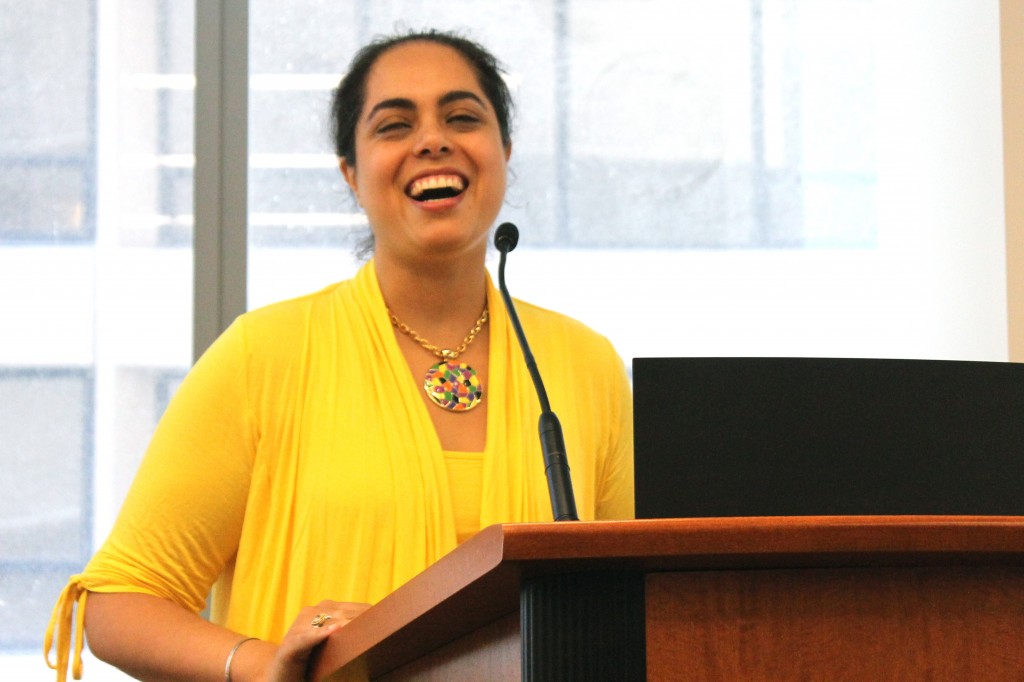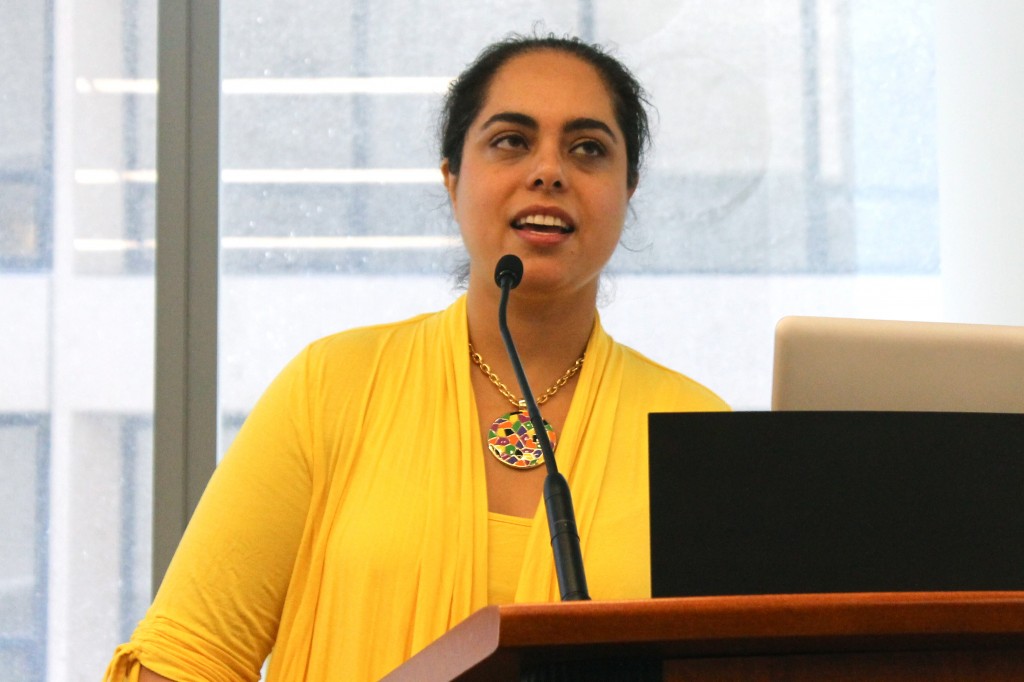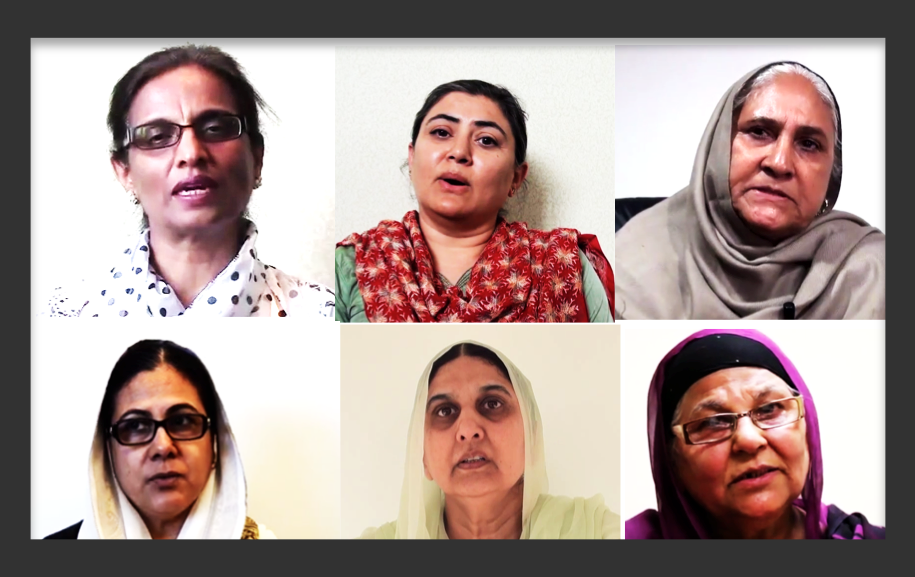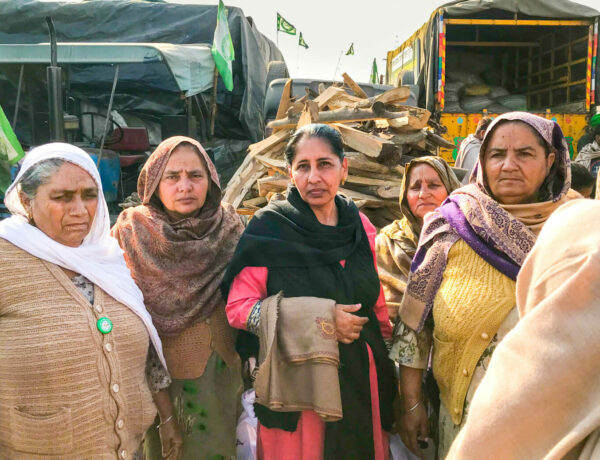On Sunday July 20th, Sapreet Kaur, the Executive Director of the Sikh Coalition, was a guest speaker at the Surat Initiative’s Sikh Leadership Conference. At this conference, young Sikhs explored ideas on leadership and personal development from a gurmat perspective. The conference was geared towards individuals who wished to create positive change.
Sapreet’s conversational, charismatic style of speaking, and refreshing content left an impact of conference participants to the point where people where talking about her speech days after the conference ended. Sapreet spoke about leadership traits, Sikh qualities, and tips on how to become a better version of oneself. Many found her talk to be empowering. Below is an excerpt from her speech.
The ends do NOT justify the means
We’ve always heard the phrase, “The end justifies the means,” or “We’re achievement oriented!” or “We’re searching for a goal and striving for something.” But, one of the most beautiful things about Sikhi, is that the journey matters. For us as Sikhs the journey is as important as the destination. They interconnected and intertwined.Life is as much about how we move along our path as Sikhs and as human beings as much as it is about reaching an ultimate goal of oneness with the divine, or being a great person, or contributing someone to humanity. It’s about all the steps along the way.
The journey matters; the ends don’t justify the means. The means matter. How you live your life every day matters. It’s a million actions that lead towards spiritual enlightenment.
Living your Values
When I reflect about Sikhi, to state the obvious, Sikhi is the guide about how to live your life. It’s hard! It’s hard to be a Sikh. It’s hard to live it every day and not just talk about it. How do you as a Sikh live your values? In not just in huge life decisions but in the small ways? How do you, every single day, become a better version of yourself? Every single day, you are making a choice about the person you want to be.There are all these little moments, when you can be a better version of yourself. I find that the be the hard part. We don’t have a hard time deciding the right thing to do when there’s a big decision to be made. But, we’re not always generous, kind, or loving in our day to day. “Do not steal,” not a problem. “Do not lie,” not a problem. “Be kind to people that I know and don’t know everyday,” hard. “Understand that my needs and me are not the center of the universe,” its really hard. “Listen really well and learn from each other,” hard.
You’re reading about the life of Melson Mandela and you’re reading his ten top quotes. You can read them, you can absorb them, but can you live them?
My favorite is chardi kala. We love talking about a sprit of chardi kala but it’s hard to be in eternal optimism escially when life is difficult. But how do we do that? How do we create a well of faith? How do you have a sangat, which has been so critical to me, composed of Sikhs and non-Sikhs, intergenerational, different walks of life, that help you refill your well? How do you create a sagnat can help you through their actions, see how you can be a better version of yourself, and aspire to it?
Life has been hard, there have been a few challenging life experiences for me and its
Sikhi, my faith, that has been what’s grounded in getting through that. I’ve come to realize that I have to join forces with Wahguru. I have to do my part; I have to do my best to live those values.Seva
As a Sikh you have to live your values, every single day. For me, I have the privilege of doing this work on behalf of the panth every day. But it’s not the only way I am inspired to do seva. I actually do a fair amount of seva that isn’t specifically targeted to the Sikh community and that’s important to me. It’s important to me because, I ‘ve been touched by programs that exist or I know that there’s something meaningful in a message that needs to be amplified and I can play a role.
To be a Sikh is to serve humanity and that stretches far beyond serving langar or volunteering at a Sikh youth camp. It’s not just about us serving ourselves.
Leading by Doing
Thinking about the concept of leadership, Sikhi has the roadmap for us to become servant leaders. Part of that, as I’ve observed, is leading by doing.You can be a great orator, and its an amazing, inspiring skill and talent. You can be brilliant at saying how everything should go. But, in my experience, the moments where I feel like I have contributed as a leader is when I’ve lead by doing and when I’ve actually rolled up my sleeves and done the hard part of trying to accomplish what I’ve been saying we should accomplish. I don’t have to tell someone what to do, how to do it, or what the values we should be using to get there because I am already desperately trying to get there myself.
Creating a Vision
If you’re trying to trying to aspire to a vision for your life, that is also creating a vision for other people; they begin to see that you’re on the journey together. That’s transformative. It’s personally transformative.But remember, when you’re on this journey, don’t wait for someone else. The time is now. You’re not going to contribute to humanity and society in 30 years from now, you’re going do it today and you’re going do it tomorrow. Sometimes its going to be small actions, and sometimes its big actions. It’s you. You’re the one you’ve been waiting for. You’re the one that’s going fulfill that vision.
Sangat
What I love about Sikhi, and there are so many things, is that we don’t believe that you get one try at things and if you don’t get it right, you’re damned. We believe everyday you can aspire to be a better person, to be a better version of yourself, and if you don’t get it right, you get to try again. Sangat is here to rally around you and keep you moving forward at your journey, at your pace. That’s meant a lot to meSurround yourself with the right people, people who you want to emulate and who through their actions, inspire you. Surround yourself with people who will help pick you up when you fall because you fall a lot when you’re out there going for it. Have the right sangat and understand that even on your path of spiritually, people who aren’t Sikhs, can furthre you on your spiritual path. Some of the people who have impacted me the most haven’t even been Sikhs, but I see in them in the way they live their lives, the message of Guru Nanank and its resonated with me. That’s made a big difference.
About The Surat Initiative:
The Surat Initiative aims to provide innovative educational materials and educational advocacy on key issues pertaining to the Sikh community. Surat aims to inspire people to live a purposeful life through education.
About Spareet Kaur:
 Sapreet is the Executive Director of the Sikh Coalition, and has been in this role since September 2009. She was a member of the Coalition’s Board of Directors for two years prior to joining the organization as staff.
Sapreet is the Executive Director of the Sikh Coalition, and has been in this role since September 2009. She was a member of the Coalition’s Board of Directors for two years prior to joining the organization as staff.
Sapreet previously served as the Managing Director of Strategy within the Human Assets team at Teach for America (teachforamerica.org), a national non-profit whose mission is to build the movement to eliminate educational inequity by enlisting our nation’s most promising future leaders in the effort. At Teach for America, Sapreet was responsible for facilitating the formulation and evolution of human capital priorities and strategies covering areas such as compensation, staff retention, organizational strength, and employee satisfaction.
She volunteers with the Girl Scouts of the USA (girlscouts.org) and serves as a board member of the World Association of Girl Guides and Girl Scouts (wagggsworld.org), a 10 million member worldwide movement across 135 countries providing non-formal education where girls and young women develop leadership and life skills through self-development, challenge and adventure. She currently serves on the Desmond Tutu Peace Foundation board of directors. (tutufoundationusa.org). Sapreet is also a member of the National Organization of Returned Peace Corps Volunteers, having served as a business volunteer in Uganda and Kenya from 1998-2001. She previously served on the Board of Directors of Fellowship of Activists to Embrace Humanity, a human development organization committed to fighting poverty and promoting education in South Asia.
Sapreet is a graduate of the Stern School of Business at New York University with a dual degree in marketing and international business.






